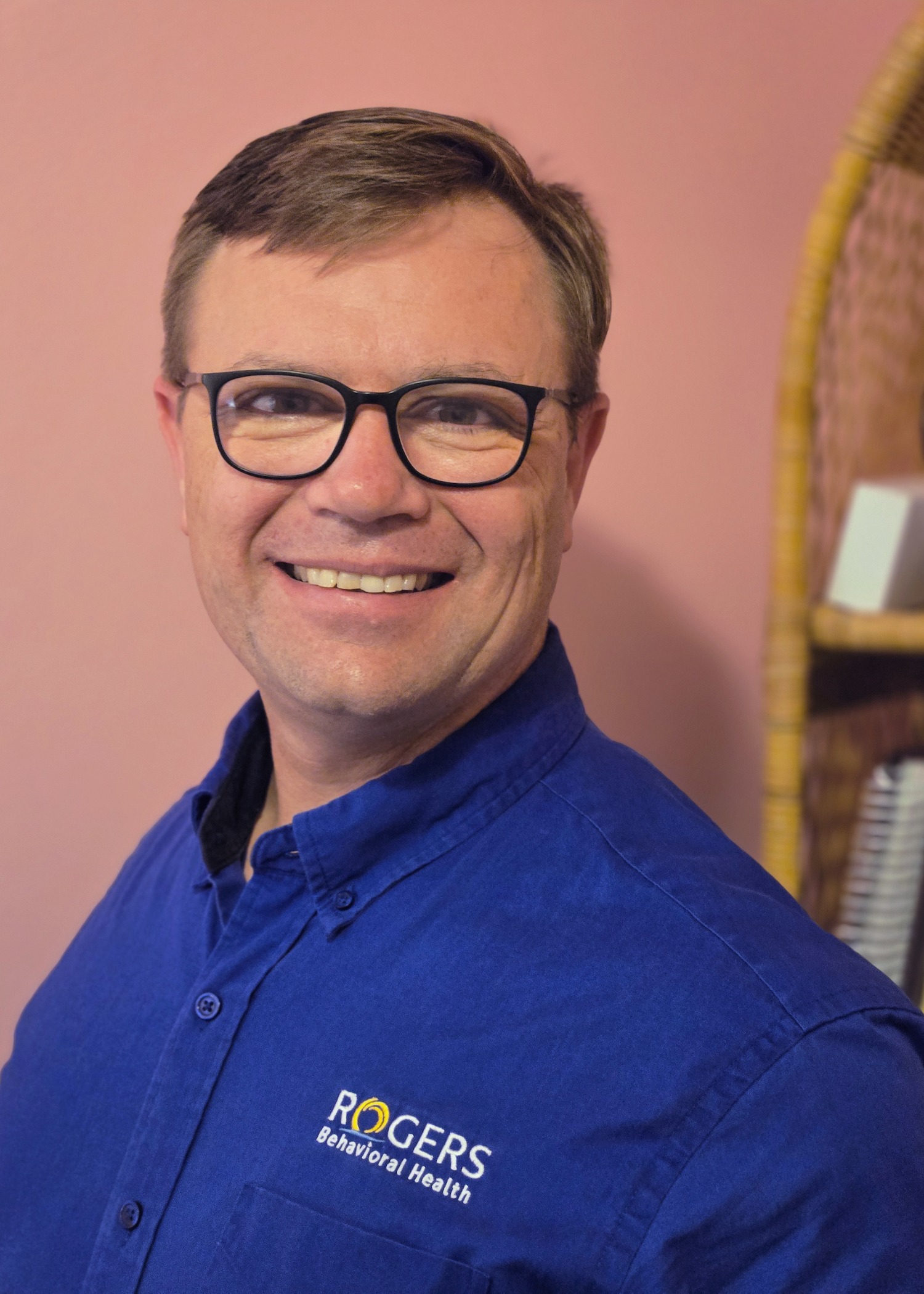
‘Spirituality is our soul song’: Rogers’ chaplain Jeromy Wells explains spirituality and how it can positively impact treatment
12/05/24 12:30:pmResearch shows spirituality is an important part of a person’s well-being, providing a framework for hope, meaning, and purpose.

“Spirituality is a critical part of our overall health,” he explains. “It’s at the core of how we make meaning and why we choose to do what we do. Whether we think of that part of our being as soul, energy, or something else that’s eternal, it is that ‘something’ that transcends time, space, and understanding. It cannot not be a part of our healing process. I think of spirituality as the way our soul expresses itself. In other words, spirituality is the voice of the soul. Spirituality is our soul song.”
Engaging in spiritual practices can foster community and connection. Additionally, spirituality is increasingly seen as an important piece of mental health and addiction recovery treatment.
“People receiving care at Rogers tell me they need to talk about their spiritual struggles with someone who can hear them without judgement, and when that happens, they feel respected and heard, more hopeful, open to change, and proactive in their treatment plans,” he shares. “I notice honesty, vulnerability, confidence, courage, a willingness to learn, and a glimmer of hopefulness in those requesting spiritual care consults.”
Five ways Rogers’ Spiritual Care Team works with people receiving treatment
Rogers’ Spiritual Care team intentionally cares for people receiving treatment through compassionate presence, soulful listening, and genuine respect.
These are five ways they practice spiritual care:
- 1. Spirituality-focused discussion groups on topics like values, self-compassion, spiritual struggles, and boundaries. These groups honor every patient’s religious preference and/or spiritual beliefs.
- Individual consults
- Facilitating clergy visits upon patient request and availability of requested clergy, such as a rabbi, mam, priest, shaman, etc.
- Providing religious and spiritual resources
- Officiating or hosting holiday services
Rogers Spiritual Care team only provides services upon patient request and are free of charge for people receiving in-patient and residential treatment in Oconomowoc, West Allis, and Brown Deer.
“We seek justice through equitable care for all,” he says. “For me, that means that we make spiritual and religious support available for all, regardless of their socioeconomic status, life choices, or their religious and spiritual affiliations. This includes, but is not limited to, providing faith-based resources for those who are seeking trauma-informed spiritual care, the marginalized and oppressed communities, and those wanting spiritual rather than religious support.”
The spiritual care department provides additional continuing education opportunities on topics, such as labyrinth walking (a circuitous path that leads from the outside to the inside at the Oconomowoc campus), religious scrupulosity, integrating Acceptance and Commitment Therapy (ACT) with spiritual practices, and nursing services orientation.
What does a spiritual care provider do?
Jeromy says spiritual care providers “attune themselves to the spiritual needs of another’s soul.” They do that by:
- Honoring another’s autonomy by respecting their right to choose their next step
- Honoring anger as a human emotion and exploring healthy and unhealthy expressions of anger
- Empowering patients to define spirituality for themselves.
- Helping patients identify where their religions or spirituality has helped and/or hindered their healing process
- Exploring what comes to mind when one thinks of the divine or sacred
- Integrating evidenced-based practices with one’s spiritual values
- Holding safe and sacred space for the expression of grief
- Guarding sacred space to honor one’s experience of the divine
- Exploring resources of hope and healing
- Exploring religious and spiritual language used in meaning making
- Facilitating mindfulness or meditation practices
- Reading sacred texts, poems, or music lyrics
- Walking in nature
- Reviewing unhealthy beliefs about oneself and brainstorming alternative perspectives.
- Honoring another’s spiritual struggle as a significant pivot-point in their life
- Clarifying spiritual values as key markers for one’s internal moral or spiritual compass
- Considering spiritual strength as a way of being flexible, healthy, and good
“The list highlights some of the ways chaplains journey with others through those times when they feel lost, like they no longer have a purpose or belong, are a burden to others, or find themselves in a pit of despair and hopelessness,” he says. “Spiritual care providers serve as spiritual companions at key points along life’s journey. They help others see their own divine spark within through those long dark nights of the soul. They remind people that they matter, they’re not alone, and that each breath taken is another sign of hope.”
Spirituality at work at Rogers
Jeromy shares ways he sees spirituality at Rogers:
“When a patient forgives themselves and accepts the entirety of their story as a part of their lived human experience.
“When a Rogers team member is going through difficult things at home and juggling life responsibilities and is still showing up for work with the sole focus of professional, compassionate, and competent patient-centered care.
“Through the connections of strangers from different cultures and religious preferences laughing and sharing a meal together.
“In the grief of a parent who lost their son to suicide and is trying to find their reason for living after his death.
“In people struggling with eating disorders or OCD as they believe deep within that there must be something beyond the fear, guilt, or shame they know all too well.
“In people who have experienced religious trauma yet still have the courage to ask for spiritual support and care.
“In people who have experienced assaults and abuse as they put trust in their treatment teams to do no harm.
“Through the connections patients make with other patients while in treatment.
“In the joyful work of our housekeeping staff.
“When I see children having fun and playing games together.
“How it works is mysteriously sacred, but when you experience it, you know. You stand in awe with a sense of universal interconnectedness and meaning that transcends time.”
How can a person begin to explore spirituality?
Jeromy offers tips for how anyone can begin to explore spirituality:
- Start from where you are in the moment. For me, this means being honest with ourselves and others about our current condition. For example, someone struggling with their use of alcohol must admit that they are powerless over it. We can only start from where we are now. We cannot go back in time and start over, and we cannot fast forward to our idealized world.
- Choose to live your values. Clarifying our values and choosing to take a step in the direction of what matters most to us is a step of faith. Often times, the next step can be the scariest and hardest to take.
- Be open to the possibility of something different than what you’ve known before.
“The metaphor of a compass is helpful for me,” he says. “Sometimes we get the sense that something is not right in our lives. In those moments we need to pause and reorient to figure out where we are and determine if we’re moving in the right direction. In order to use our internal compass correctly, we must first be properly calibrated to our True North— God, Allah, The Universe, Love, Justice, or whatever one defines as ultimate—before we can begin to plot our path in the direction that matters most to us according to our chosen values, such as compassion, loyalty, integrity, and so on.”
Spiritual care is fully funded through donations to Rogers Foundation. To learn more about spiritual care at Rogers, click here.
Getting to know Jeromy
Chaplain Jeromy has been at Rogers in Oconomowoc since August 2023.
He was ordained at Westfield Baptist Church in Dunn, North Carolina in June 2001. He retired honorably from the United States Air Force after 30 years of combined honorable service on active duty, reserve, and guard service as an enlisted Airmen (E-1) through the rank of Lieutenant Colonel (O-5). Throughout his time in the Air Force, Jeromy won many individual awards and led several chapel teams to win annual awards. He is a seasoned chaplain with more than 21 years as a professional chaplain in various clinical and military settings across the globe. Jeromy has been endorsed and in good standing with the Cooperative Baptist Fellowship since 2002. He was board-certified chaplain with the Association of Professional Chaplains since 2015 and currently serves as a certification specialist for several candidate committees annually. Jeromy completed an 18-month certification program for Mental Health Integration for Chaplaincy Services through the Veteran’s Affairs in 2016 and completed his 200-hour yoga teacher certification at Moonbird Yoga Studio in O’Fallon, Illinois in 2021. Finally, he earned his Doctor of Ministry degree in Integrative Chaplaincy through the University of Vanderbilt Divinity School in Nashville, Tennessee in May 2024.
Favorite scripture passage:
“[Jesus] had compassion on them…” (Matthew 14:14)
Favorite quotes:
“As you start to walk on the way, the way appears.” - Rumi
“Be still in the silence and aware of the love with and within.” - Tess Ward
Favorite book:
The Boy, The Mole, The Fox, and The Horse, by Charlie Mackesy
| Spiritual Care Team activity Jan 2024 - Oct 2024 |
|---|
| Clergy visits facilitated: 114 |
| # of patients who attended spirituality-focused discussion groups: 1468 |
| 50% of all individual care consults are requested from adult patients receiving residential treatment |
| 1/3 of all spiritual care consults occur on adult inpatient |





